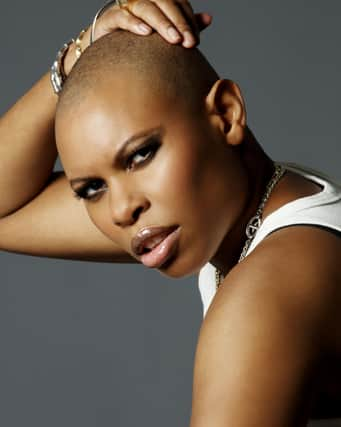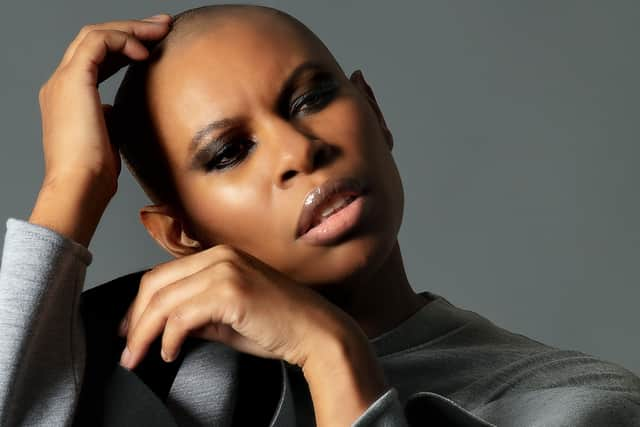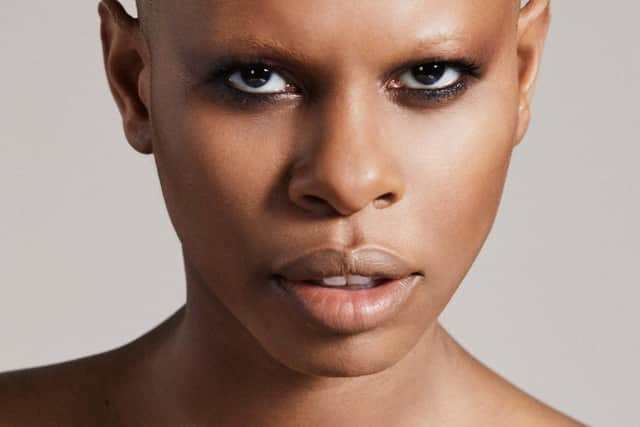Skin from Skunk Anansie: ‘When I hear people going on about Britpop our history just gets thrown away’


Six months on, she enthusiastically recalls the songwriting masterclass. “I really like doing that kind of thing,” she says via Zoom from her home in Ibiza. “It was really fun, the students were all really amazing. I guess I’m a bit of an elder statesman now after 25 years.”
The event is mentioned in her new book, It Takes Blood and Guts, a fascinating journey into the life of the singer – born Deborah Anne Dyer – who has blazed a trail as a multi-million selling artist, social and cultural activist and champion of LGBTQ+ rights. The book was co-written with Leeds University-educated music writer Lucy O’Brien, author of biographies of Dusty Springfield, Annie Lennox and Madonna.
Advertisement
Hide AdAdvertisement
Hide AdThe pair became friends after first meeting in Hollywood in 1995, on the set of Kathryn Bigelow’s film Strange Days, in which Skunk Anansie had a cameo role.
“I remember thinking, ‘she doesn’t look like a music journalist, she looks like someone you can go and have a drink with’,” says Skin of her co-writer recalling her “natural, easy vibe”. For her part, O’Brien says: “The way you’d been written about was this really scary singer, full-on, a major punk-rock icon already, so I was really excited to meet you but I didn’t quite know what to expect, and there was this lovely, sweet, funny woman and we just hit it off.”
The impulse to write It Takes Blood and Guts stemmed from a desire to point out the achievements of a band who have been largely ignored by other books about music in the 1990s.
“I think people are very quick to airbrush out Black history in particular,” Skin notes. “People see things that white people have done as more important. People write about Britpop but forget there was this huge drum & bass scene at the same time headed by Goldie, and that really affected rock and so many other genres of music. It’s the same with gay history or female history, everything gets pushed aside for the European story.”
Advertisement
Hide AdAdvertisement
Hide Ad“Oasis, Blur and Pulp are really great bands but I felt like they’d had so much exposure,” says O’Brien. “I felt it’s time for other stories to come through. The other thing that prompted it was the Windrush scandal, I was thinking about the injustice of that, and the way that Black British history was overlooked and people were treated with disrespect.”


“They literally deleted our history and then said, ‘Well, it’s not there any more’,” says Skin. “They chucked out the (Windrush landing) cards, they just didn’t think these Black people’s histories were important so they just threw them away. When I hear people going on about Britpop our history just gets thrown away in the same way.
“Britpop was a very white, almost misogynistic, laddy, non-diverse kind of thing and (Black) people look back and think, ‘Yeah, that’s how we felt at the time’ and it kind of feels like that now when people talk about British music and British history, it’s like you’re doing the same thing that you did back then, making us feel that we’re not part of something, like we don’t exist.”
O’Brien agrees with Skin’s assessment that “it felt like Skunk Anansie were ahead of their time, not just the image but the music itself, lots of different styles, that collision of electronic and drum & bass elements”. “That’s what made it so exciting,” she says.
Advertisement
Hide AdAdvertisement
Hide AdIn the book Skin says she had lived a “loud life”. She says she’s often thought about how her childhood in Brixton – with her mother and three brothers – shaped her. “Our back garden backed onto a railway line, so when I say I’ve lived a loud life literally we were shouting above trains going past,” she says. “One of the things you get from living in Brixton is attitude, you have to be streetwise and you’ve got to have big shoulders because in some ways it’s the survival of the fittest, especially when you’re surrounded by three boisterous brothers.”


Her early musical favourites included Bob Marley, the Bay City Rollers and Adam Ant, but watching Blondie on Top of the Pops made her want to become a singer. “I’m still mystified by that,” she laughs. “Why was it Debbie Harry that made me think, ‘I want to do that’ – somebody who was nothing like me? Top of the Pops was so vital to my upbringing. The first rock song I knew was Whole Lotta Love by Led Zeppelin that was the Top of the Pops theme tune.”
Skin began singing while studying interior architecture and design at Teesside Polytechnic – “My first experiences were jazz,” she recalls. “I was in this student band and it was absolutely terrifying, it was the first time that I’d gone onstage in front of people and I knew them all, which was also terrifying, but I kept putting myself in a position of saying yes so then I would have to go and deal with it. That’s something that I do even now...I’ll say yes and then learn on my feet as I’m going along.”
It was in Middlesbrough that she discovered the town’s gay scene. Moving back to London after graduating, she became more adventurous, visiting Venus Rising, a lesbian party at the Fridge club. In London’s music scene she also met Len Arran, with whom she formed a long-term songwriting partnership, and bassist Richard ‘Cass’ Lewis as well as manager Leigh Johnson. Their first band would be Mama Wild before the formation in 1994 of Skunk Anansie with guitarist Martin ‘Ace’ Kent. Drummer Mark Richardson would join a year later after their first album, Paranoid & Sunburnt.
Advertisement
Hide AdAdvertisement
Hide AdSkin says consistency behind the scenes has been important. “I’ve had the same team, bar my accountant, from the very early days. Charlie Myatt as our agent, Leigh as manager and I’ve only had two lawyers in my whole career. Cass (and I) were in a band together and then we put Skunk Anansie together so he’s definitely the musical rock, we always start the ideas together because he’s very good at understanding, I can sing him something and then he’ll just play it and he’s good at translating that to the rest of the band.
Through the 1990s, Skunk Anansie sold 5m records with hits such as Weak, Charity and Hedonism. Yet they encountered prejudice while touring America’s Bible Belt. “The impression that Europeans get of America I discovered after a while was not very accurate,” Skin says. “The impression we’re getting is New York, LA, San Francisco, Chicago, those four cities...but really that’s ten per cent of America, most is really the Bible Belt and it wasn’t until Trump got elected that we really saw those people come out in droves, but we discovered while touring...that Bible Belt really is like a completely different country in many ways. You’ll drive into a town and all the restaurants will be on a strip and people live in these rural places that are really quite far from each other, and that was much more typical of the America that we saw in the 90s. We definitely had a false impression, we thought America was going to be a lot more diverse and much more integrated. We thought it was going to be like Friends or something, and it really wasn’t.
“I guess that in England, especially in London, we were in our diverse, integrated bubble where everybody was equal and there were all these different kinds of people hanging out with each other all the time around King’s Cross. In those days we thought that was what everybody’s world was like. Touring up and down the country we realised how limited our view was.”
In July 1998 Skunk Anansie were invited to perform at Nelson Mandela’s 80th birthday celebrations in South Africa. As a longtime anti-apartheid campaigner, Skin says it was “pretty special”. “That’s something I’d been thinking about from an early age, how utterly unfair apartheid was, how could people be like that? As an adult you become less naive and realise it’s about people wanting to have power over another race of people so they can keep their land and all the good things they have.
Advertisement
Hide AdAdvertisement
Hide Ad“It was quite magical to meet Nelson Mandela and all those people, and not to be disappointed, to actually come away from meeting him feeling better and even more enamoured and in wonderment than you had when you walked up to him.”
In 1999 Skunk Anansie headlined the closing night of Glastonbury festival. Two decades later, Skin was forced to remind the press that they were the first Black artists to do so, long before Beyonce or Stormzy. “It was what I was talking about before, about erasing Black stories or Black history,” she says today. “The worst thing that can happen is that people just don’t talk about Skunk Anansie or their history or the effect they had on the music industry, and that definitely happened with that whole story. It’s the easy, disrespectful way to not want to deal with something, ‘let’s just not talk about it’.
“I think the press would’ve been happy if I’d have slagged off Stormzy at his greatest moment, because I think there was an element of the press that would have loved to have used me as a stick to beat this important artist with, which wasn’t about to happen, but (for me) it was more about, ‘hello, it wasn’t Beyonce or anyone else, it was actually Skunk Anansie, and before Skunk Anansie it was The Prodigy, it was Maxim’. The fact that you had to put your hand up and wave and say, ‘hello, we’re still here’, that’s really the issue.
“The question is, why does it take so long for Black artists to headline these festivals? Skunk Anansie were the first diverse band to headline quite a few festivals throughout Europe, there were so many firsts that we don’t even know, because there were very few bands like us. There were some days where the only Black people onstage that day would be Cass and myself. You look back and think lots of bands could have done it – Dizzee Rascal could have done it, Goldie could have done it – but there’s a sense or a feeling (among festivals) that these artists aren’t quite as popular or don’t quite deserve it or aren’t thought about in those sort of terms. Hopefully with Stormzy doing Glastonbury that will change.”
Advertisement
Hide AdAdvertisement
Hide AdWhen Skunk Anansie split in 2001, Skin made two solo albums and worked on a number of dance music projects before the band eventually reformed. In hindsight, she says: “It probably would have been better for Skunk Anansie to have had a hiatus than to actually have broken up...but I actually don’t fully take the blame because I felt like that for a reason, and everybody has a part in it, to be honest. I was just the one that pressed the button. But who knows? I don’t think we would be around now if we hadn’t stopped then.”
In 2018 Skin was named the Most Inspirational Artist at the Music Week Women in Music Awards. She says “it’s hard to say” if the tide is turning in terms of recognition for her and Skunk Anansie’s achievements. “I would hope so,” she says. “And I hope this book will go a bit more towards that. It’s like I don’t need to be invited for a seat at the table, I deserve a seat at the table because of my merits, not because I’m Black or all those kind of things, but because I’ve achieved just as much stuff as a lot of other bands from the 90s.”
In the meantime she hopes appearances as a judge on the Italian version of The X Factor and as a contestant in ITV’s The Masked Singer may serve a dual purpose. “I think I have this image as very serious and aggressive and political and no sense of humour, tall and Amazonian,” she says. “I kind of do those things (on TV) first to challenge my own character, to see if I can actually do it, and then to change people’s perceptions of who they think I am.”
It Takes Blood and Guts by Skin and Lucy O’Brien is out now in hardback, ebook and audiobook.
Skunk Anansie are due to play at O2 Academy Sheffield on June 18, 2021 and O2 Academy Leeds on June 25, 2021. skunkanansie.com
Comment Guidelines
National World encourages reader discussion on our stories. User feedback, insights and back-and-forth exchanges add a rich layer of context to reporting. Please review our Community Guidelines before commenting.